
Reclaim Your Asset
Information is your most important asset – knowing or disclosing just ONE extra piece of information could change your life.
Yet currently most of your information is stored remotely in the “Cloud” and processed by parties that have DIFFERENT interests and aspirations to you.
You interact through their interfaces and you play by their rules, basically you have lost control – your most important asset is NO longer yours.
Citizen Synergy is about people working together to take back their most valuable asset from the "Cloud".
Problems with the Cloud
The word “Cloud” is just a marketing term that can mean whatever the person trying to sell something wants it to mean, as articulated by Larry Ellison below.
Here we will define Cloud Computing (the "Cloud") as all services that take information from you (crowd-sourced the data) to build up their own assets, thus increasing THEIR power and value while reducing YOURS.
Concentration of Power
We are not just talking about massive problems with Cloud Computing raised in The Social Dilemma, Facial Recognition or Attention Wars, we are also talking about an even bigger problem – the fundamental shift in power across the world.

Internet was originally designed to provide DIRECT communication with computers owned by users. Now, the internet is mainly used for INTERCEPTED communication with computers owned by the cloud.
The current concentration of data processing and storage in the Cloud means the broadband funded by EVERYONE is now being used to benefit just a FEW.
Having a few organisations being the hubs of the world’s information results in way too much power. As Lord Acton remarked "power tends to corrupt and absolute power corrupts absolutely", the Cloud just cannot be trusted.
- Directors of the Cloud do not have your interests in mind e.g. Facebook directors.
- Even if you can trust the directors of the Cloud, you cannot trust the Cloud’s employees e.g. Facebook employees.
- Even if you can trust the Cloud employees, you cannot trust that the Cloud will not get hacked from the outside e.g. Facebook hacked.
Facebook is just ONE of many cloud services, there are problems EVERYWHERE you look from TikTok to Tinder, from Apple to Google to those innocent looking weather channels.
Whether you are using the Cloud for your searches or your videos, you are using THEIR algorithms (they decide what to tell you about the world, what data about you to sell to who, when to insert which advertisement into your view etc.), that is, they control your information environment and thus they also control your life.
Having someone who controls a large part of your life acting against your interests is a problem.
The situation is getting worse everyday as more "smart" devices are deployed inside of homes, these vulnerable devices (from speakers to cameras to teddy bears) are massive security risks – as they are now making connections to the Cloud "internally" from your local network, your home broadband router is no longer effective in blocking these what really in fact are "external" connections.
So beside seeing and influencing your external world view, with the help of these home devices the Cloud can now see into your local network (which were previously off-limits to scanners and web crawlers). Most of these devices will not even work without an internet connection back to the Cloud – so data from your most private space is now shipped all over the world 24×7.
Internet and Road Analogy
Cloud Computing is like a bus company using the roads (the internet) paid for by the citizens (either privately or through their government) to run its bus services. citizen Computing is about reclaiming the roads for ourselves and drive on them in our own cars.
Road utilisation improves (as the whole road network can now be used to carry traffic of everybody from any point to any point instead of just bus traffic) and citizen productivity improves (as they no longer need to follow the dictated bus routes nor the bus timetables).
The FREEDOM that comes with owning your information assets is similar to taking ownership of physical assets, like your own CAR and your own HOME – you can go anywhere at anytime without worrying about bus timetables, you can renovate your room however you like etc. You no longer need to dance to the tune of the owners of the Cloud.
Taxpayers funded a lot of the telecommunication (transport) infrastructure in a country, yet the traditional point to point model has now been replaced with a hub and spoke model. One of the most valuable resources of a country that was built up over decades has become an extension for the Cloud.
The better the citizens build their broadband, the more data the Cloud collects, the more it controls the citizens’ lives. The broadband is used to monitor and influence them (e.g. search results, buying habits, meeting people etc.) based on the Cloud’s algorithms and the Cloud’s interests.
As if removing the freedom to travel anywhere and taking over the use of the roads they did not built are not bad enough, the Cloud increasingly trying to.
Limitations of Regulations
While initiatives like European Union’s General Data Protection Regulation are great, the restriction of the Cloud in handling citizen data can reduce the value of those data if alternative processing of those data are not found.
Instead of removing the data after they have already gone into the Cloud as promoted by the right to be forgotten, what about not giving so much data to the Cloud in the first place ?
Besides restricting what the Cloud can or cannot do to citizen data, may be the governments should also be encouraging the citizens to do more with their own data themselves?
Solution with Citizen Synergy
Our definition of "Information Asset" is broader than the definitions used by others, we include not just your data but also your ability to process those data – your own computing infrastructure – as a critical part of your information asset.
The challenge in the past has been the difficulty involved in building up computing infrastructure yourself, thus the rapid rise of the Cloud and as computing infrastructure is moved away from you, so are your information assets. Whether it is shopping or voting, your data are now being used to work ON you instead of work FOR you.
Citizen Computing provides a gradual and low cost way of building up your own computing infrastructure e.g. just having your mobile phone is enough to get started.
Some Citizen Applications (e.g. contacttrace.com.au) are starting to appear, which you can use to build up your information assets immediately. First by storing the acquired data asset on your mobile phone (e.g. personal map) and then later on add low cost computers (e.g. home stations) at homes (or wherever) to provide more stable computing power to grow your information assets beyond the capabilities of your phone.
Better Than Free
With almost everyone on earth being fed a diet of FREE services by Cloud Computing for so many years, it would be difficult to move people away from the Cloud, unless there is something that is BETTER THAN FREE.
The increasing transfer of the world’s information assets (and thus power) from so many to so few is occurring because the Cloud does bring significant INITIAL BENEFITS to the end users:
- The Cloud is FAST to join and submit your data into BUT have you tried leaving or taking your data out ? Deleting your data is not so fast ?
- The Cloud is EASY to use if your follow their rules BUT have you tried changing their operation ? Complaining is not so easy ?
- The Cloud is CHEAP when you start BUT what about after you are hooked ? The premium versions are not so cheap ?
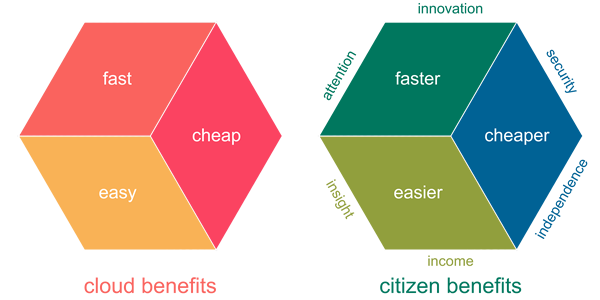
Something that needs to be FASTER, EASIER and CHEAPER than the Cloud but WITHOUT manipulating the users’ world view NOR selling users’ data.
It needs to offer benefits that are not possible under Cloud Computing (like substantially improving the users’ Attention, Income, Independence, Innovation, Insight and Security)
The trillion dollar question is HOW ?
Decentralising Computing
The obvious solution to the problems with Centralisation of computing in the Cloud is its Decentralisation, a similar process happened about half a century ago.
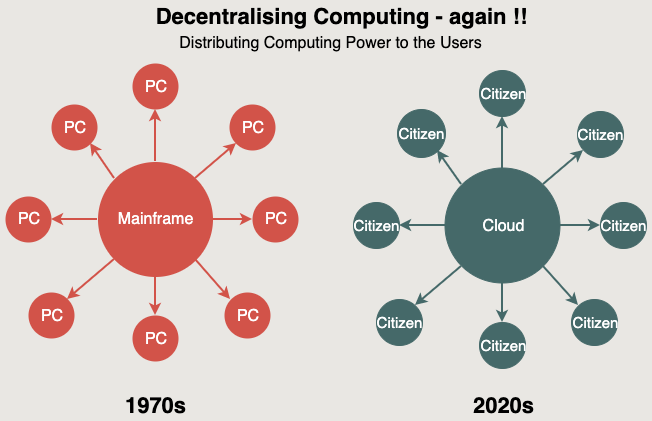
In the 1970s Personal Computer
distributes the centralised computing power of the Mainframe to the masses.
In the 2020s Citizen Computing
distributes the centralised computing power of the Cloud to the masses.
In the 1970s there was NO computing power at home because there was no computing infrastructure there, so pushing out computer hardware is a great step in decentralisation.
In the 2020s there are plenty computing infrastructure at home (e.g. phones, laptops, wifi, broadband etc.) but still NO computing power, those home computing infrastructure are just dumb interfaces to the REAL computing power in the Cloud.
Now computing infrastructure is no longer scarce, what is scarce is the CONTROL of those computing infrastructure.
With exponential explosion of information in the past decades, the Cloud Infrastructure provides end users with a cheap and easy way of interacting with the increasing amount of information around the world BUT by doing so the Cloud also controls the world’s information.
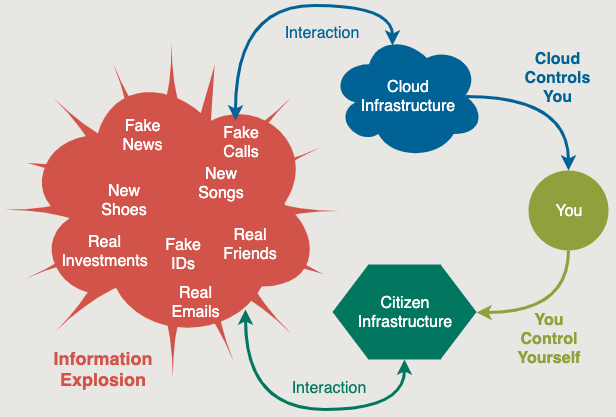
With numerous massive data centres around the world, there is NO WAY for citizen Computing to match the scale of the economies of the Cloud using traditional infrastructure.
But what if we turn the traditional control flow UPSIDE DOWN ?
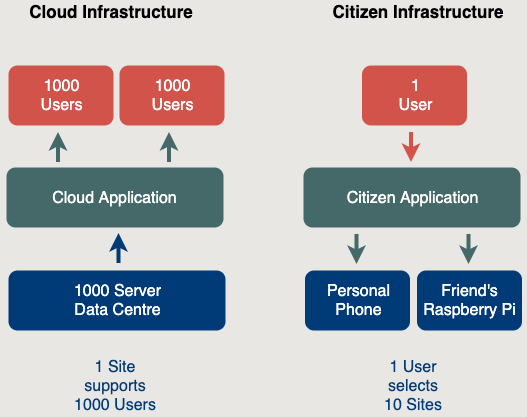
Instead of having to support thousands, the "upside down" citizen infrastructure only has to support one.
For each application and each user, there is an application-specific user-driven infrastructure which is highly diverse, globally distributed, fully encrypted and self-heals.
By leveraging off each other’s infrastructure, citizen computing users have access to a wide range of infrastructure to suit their specific needs – pick a site in the neighbourhood for low latency daily use, pick a site in another city for disaster recovery.
Unlike Cloud data centres with thousands computers inside, there is no special cooling, no security guard, no redundant power, no fibre loops required.
Asset Zones
The principle of Separation of Powers is important in the functioning of a government, the same principle is used in handling information assets.
Concentration of data means concentration of power, there is actually NO need to create massive concentrate data in most cases. 5 friends sharing photos between themselves do NOT need to share them on a Cloud platform with 500 million other users and a lawyer should NOT share a file with a client on a Cloud platform with 20 million other files.
Instead of all data processed by one infrastructure, different data need to be processed by separate infrastructures that are appropriate for them.
In Citizen Computing the principle of separation of powers is enforced by handling Information Assets in three separate ZONES with independent infrastructures.
- Personal Zone handles the most private and complete data of the owners.
- Fiduciary Zone processes owner released data according to agreed templates between all related parties.
- Community Zone receives results of the processed data provided by multiple owners.
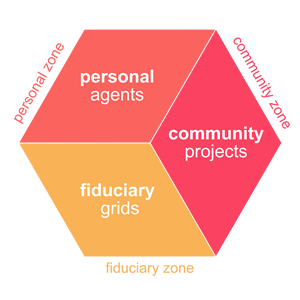
Raw data (from the information asset owner) used in the Fiduciary Zone are not to be disclosed to Community Zone and the detailed source code used by the Community Zone (to process the owner’s data) are not required to be disclosed to the owner of the raw data (in most applications).
An example is Citizen Assisted Contact Tracing https://contacttrace.com.au with 3 Asset Zones:
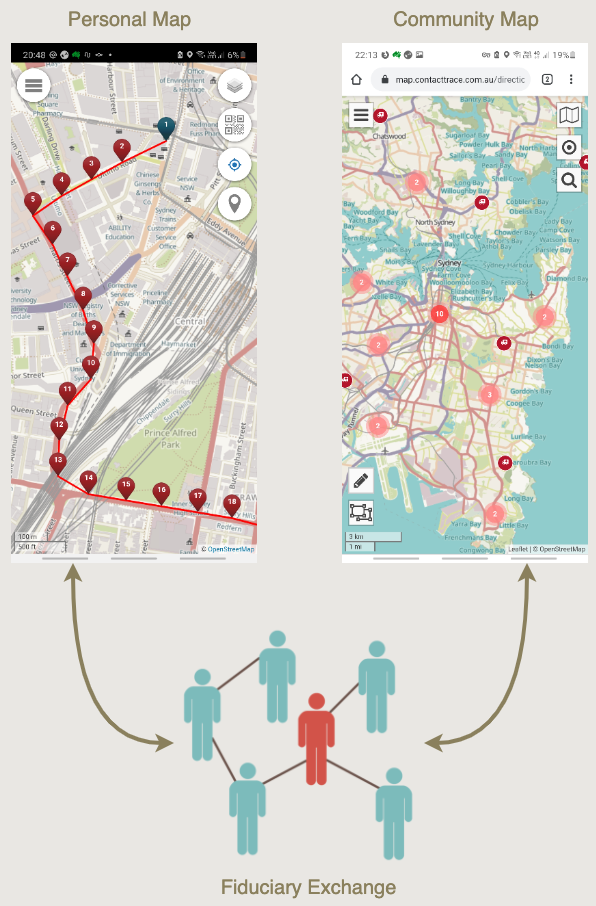
Personal Zone – Citizen Assisted Contact Tracing’s Personal Map
Fiduciary Zone – Citizen Assisted Contact Tracing’s Fiduciary Exchange
Community Zone – Citizen Assisted Contact Tracing’s Community Map
Citizen Computing complements instead of replaces Cloud Computing, it simply move information assets to places where it makes sense, enabling the user to control how much data to release into each zone for how much return.
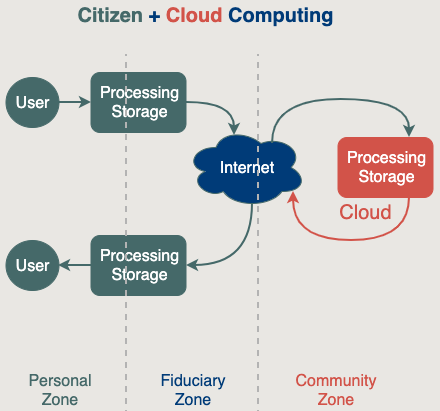
The incumbent power of the Cloud Computing can be leveraged nicely in the Community Zone, where user private data in the Personal Zone can be processed in the Fiduciary Zone before releasing to members of different communities in the Cloud.
Crowd-Sourced vs Crowd-Owned
With Cloud Computing (Crowd-SOURCED data), your information assets are being transferred to the Cloud everyday to become THEIR assets.
With Citizen Computing (Crowd-OWNED data), you build up your OWN information assets (instead of building up the Cloud’s information assets).
Currently, you are ALREADY exposing every aspect of your life to the Cloud for the Cloud’s benefit, all citizen Computing does is to enable you to use those SAME data for your own benefit.
Regaining control of your information and reclaiming its ownership, means IMPROVEMENTS in critical areas like Attention, Income, Independence, Innovation, Insight and Security.
Better Attention
Time is generally more valuable than money and attention is always MORE VALUABLE THAN TIME. There is no point spending hours with someone who is not paying attention to you.
One of the major ways Cloud Computing makes money is by taking away this most valuable aspect of your life – constantly interrupting your thoughts by advertisements and notifications.
It takes more than 20 minutes to return to the original task after a distraction, yes 20 minutes NOT 20 seconds. As shown in Attention Wars both the profits to them and damages to you can be substantial.
Citizen Computing allows you to CONTROL exactly when you want to focus on ONE thing and when you want to be inspired by DIFFERENT things.
With Citizen Computing you access the Internet with the protection of Satellite servers giving you a fully tuneable online experience so you can conserve your attention for more important things.
Better Income
One immediate benefit of owning your information asset is the ability to sell it (just like what the Cloud is doing).
You are simply redirecting money for your movements from location data harvesters back to you.
Location data is just a small part of your information asset, other data can be of high value also, for example:
- your contact list (your friends’ network, your business contacts etc.)
- your shopping preferences (both online and real stores)
- how long is the wait (e.g. at the hospital emergency department)
- your health (diet, exercise, blood pressure, sleep cycles etc.)
if you managed to collect it someone will probably pay for it.
Citizen Computing allows you to CONTROL what data to give out, for how long, to whom, at what resolution, for what purpose, how much to charge etc. etc.
For example, with Citizen Assisted Contact Tracing the data collected for COVID-19 can be used to create income.
Better Independence
Gain independence from the Cloud by setting up your own rules instead of following theirs.
Ownership means you have full visibility and control of your data exclusively at any time:
- NO need to ask others what data they have on you and hope that they give you the true picture, because with citizen computing you decide what data to give to them in the first place.
- NO need to complain that others change their rules of engagement after you have already given them your data, because with citizen computing you set the rules on your data not them.
The problem is not just being forced to view ads when you don’t want to view them, another problem is that the ads were NOT there before!
The massive growth of a Cloud service based on no ads has allowed competition to be crushed, so when ad viewing is being forced there is nowhere for the viewers to turn to!
And since you are now forced to view ads, they can now profile your INTERESTS down to how many seconds it takes for you to click the "Skip" button.
With citizen Computing EVERYONE now has access to their OWN computation capabilities and can communicate DIRECTLY with each other using the Internet.
Users NO LONGER need the Cloud to connect with each other, NO LONGER need the Cloud for performance and NO LONGER need the Cloud for free services.
But simple point and click, you control how and which Node to use in your infrastructure, you decide what features, what privacy, what cost, what reliability, what capacity, what speed you want for each application.
Achieve self-determination and prevent undue influence, you no longer need to dance to the tune of the owners of the Cloud.
Better Innovation
Leaving the innovations of the WHOLE WORLD’s information technology to the managers of a handful of Cloud companies does not make sense.
Innovation is about NEW ideas; it is difficult to get the best new ideas if it is always from the same OLD group of people (the Cloud).
Imagine you travelled around the world and the landscapes in every country look the same! The same applies to the domination of the Cloud in the information landscape around the world.
Citizen Computing enabled you to change your information environment and implement your new ideas at anytime, without the need to wait for the Cloud development nor approval.
The Infrastructure Templates enable non-technical people to create new Application Zones for themselves but mixing and matching modules easily.
Having your own private information assets that you have full control and can experiment with endlessly means innovation without limit, creating amazing applications (for personal use or for the whole community) that were not possible before.
With Citizen Computing you can build, change or just mix and match Module Nodes to create new services without needing technical skills.
Better Insight
Your life should be more interesting to YOU than any Hollywood star.
Collecting every bit of data about yourself and your environment will provide unexpected deep insights into yourself and the world that can change your life.
For example through the Personal Map you gain a heighten awareness of your current environment in real-time and by analysing the detailed data it collected about your movements and contacts you can see yourself in a new light.
To increase the value of your location data, you can click on Map Pins and record additional data like shopping receipts, car number plates etc. against any location you have visited.
Moving beyond simply "browsing" your data, you can also run Artificial Intelligence programs on your own data to get deeper insights into your life style.
You are the only one to experience your life from your perspective, it is impossible for anyone, not even your mother, to know all your needs and wants, letting Cloud Artificial Intelligence (AI) learn from your data and then influence you is problematic.
- Unless you are specifically being targetted, Cloud AI is normally trained by the engineers for a lot of people (instead of you, just for you), so WILL get things wrong.
- Cloud AI is controlled by someone with DIFFERENT interests to you.
- Since the AI is remote, you have ZERO idea what it thinks of you, it might not be favourable or it might be plain wrong.
There is no need for lengthy ethical debates on AI, the only AI you should let near your data is your own AI running in your Personal Zone and may be some AI running in the Fiduciary Zone (where you retain control while sharing your data).
With Citizen Computing you performing facial recognition on your photos yourself instead of exposing photos to external parties.
Better Security
1. Single Vendor Problems
The Cloud can make a lot of claims (e.g. uses open sourced software, does not keep logs on servers etc.) but how do you know those claims are true ?
Take the Signal service as an example, which is endorsed by Edward Snowden and Elon Musk:
- it needs a PHONE NUMBER from you (which can be used to not just identify you but also everyone you called or called you).
- by being a mobile app in Apple and Google app stores and using their push notifications, it is basically sharing your metadata with Apple or Google.
- it is centralised, the outage shows that it is in the middle relaying ALL the calls.
We are talking about ONE party getting ALL the phone numbers, ALL the times of call connection, ALL IP addresses of ALL its users worldwide (as well as leaking metadata to Apple and Google).
- Even if you can trust the ideas behind Signal, can you trust the directors of Signal always behaving properly forever in the future?
- Even if you can trust the directors of Signal, can you trust every staff of Signal always behaving properly forever in the future?
- Even if you can trust the staff of Signal, can you trust that the honest actions are so perfectly executed that your information is not leaked?
- Even if you can trust that your information will not be leaked accidently, can you trust that the there are no malicious actors coming in and stealing them?
Signal is just an example, these trust problems apply to ANY centralised service that claims to protect "privacy" e.g. your favourite VPN Service or Bitcoin Mixer. And if they ask for payment, which any proper service should, then you just created another attack vector into your identity.
2. Device Problems
The trust problems above also apply to all devices which are connected to the internet from cameras to teddy bears and of course mobile phones.
3. Phone Problems
Whether it is remote servers in the cloud or the mobile phone in your hand, centralising data on devices that you have little control is dangerous. From iOS hacks to Android vulnerabilities to methods leaked in Vault 7 the data centralised on the mobile platform are too valuable to be left alone.
4. Large Target Problems
Large centralised databases (storing your location, contacts etc.) become very high value targets, look at the massive leaks at Facebook which just happened AGAIN after the problem was supposed to have been fixed after the last leak.
5. Distribute Risk
Citizen Computing has been designed assuming that Nodes will get hacked, that Nodes will be lost, that Nodes will be located with people who turned "bad" etc., so by cutting up an Application into as many Nodes as possible. More importantly you can change the number of Nodes, for some Applications you might want additional Nodes to be extra safe.
There are separations between Zones (e.g. Personal, Fiduciary, Community etc.), there are separations between functions (e.g. Identification, Collection, Distribution, Notification etc.), there are separations based on time (e.g. maximum one day’s data), there are separations of networking, processing, storage and the physical location site itself (so they can all keep an eye on each other).
The less amount of data a Node holds, the less data there is to be stolen if that node got hacked and the easier it is to recover if that Node got damaged.
The more Nodes you have, the less damage can be done by one and the more they can check on each other.
6. Scalable Safety
Citizen Computing lets you specify which Node to use for which Module, so for some Modules you might like to use Nodes from people you actually know and located in places you have actually visited.
7. Universal Encryption
With Citizen Computing everything is encrypted whenever possible, double or even triple in most cases.
8. Aliases Encouraged
People need to behave differently in front of different groups of people, you need them to know different things about you.
Getting everyone you know on the SAME "social" platform to see one view of you or timeline of yours just does NOT make sense!
For different situations, Citizen Computing allows you to disclose different and just enough information about yourself under each identity, leaving out the rest of the data for privacy and profit.
9. Independent Monitoring
Citizen Computing has basic security rules which prevent you doing dangerous things in general (e.g. uploading unencrypted data to Nodes outside of your Personal Zone, blocking known bad IP addresses etc.) all of which you can of course turn off.
